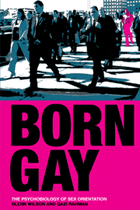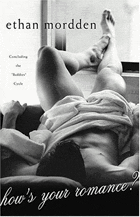 In this
issue, our man from England, Tony Heyes, reviews
In this
issue, our man from England, Tony Heyes, reviewsBorn Gay by Glenn Wilson and Qazi Rahman
How's Your Romance? by Ethan Mordden
If you would like Tony to review a book, please contact him, here.
  Born Gay: the Psychology of Sex Orientation Born Gay: the Psychology of Sex OrientationBy Glenn Wilson and Qazi Rahman Published by Peter Owen 2005 ISBN: 0 7206 11233 Most of us are familiar with the old joke: Young man writes on wall, “My mother made me a homosexual”. Shortly afterwards someone writes underneath, “If I buy her the wool, will she make me one too?” The author of the first statement is probably a Freudian, of the second, a sceptic. The causes of homosexuality have long been debated. Some gay people find the argument irrelevant. As far as they are concerned gayness is simply a given and should be accepted as such. For as long as they can remember gayness has been an essential part of their being and any attempt to track down its origins or play the blame game will not alter that fact. The vital fact is that it wasn’t a choice; they play the hand they were dealt and get on with life. Unfortunately, for some people this level of insouciance is not possible. They are objects of ridicule, victims of discrimination or racked with guilt. Anything that would enable them to say that they are simply one facet of Nature’s manifold variety would offer some sort of relief and lift the burden of perversion or abnormality from their shoulders. For such people Drs. Wilson and Rahman’s book, Born Gay, offers a welcome lifeline. Dr. Glenn Wilson is Reader in Personality at the Institute of Psychiatry, University of London. Dr. Qazi Rahman is Lecturer in Psychobiology at the University of East London. In Born Gay the authors critically examine all the theories and research into the possible causes of homosexuality. At the outset they dismiss Freudian theory for the fanciful, unfalsifiable claptrap that it is. It is such a mass of contradictions – hostile father, absent father, domineering mother, overly protective mother – that it’s surprising that it was given credence as long as it was. And surely the concept of the anal-retentive personality, arising from faulty potty training, is one of the most absurd notions to disgrace the annals of medicine? That the musings of a Viennese patriarch should have been accorded the same reverence as Holy Writ must remain one of the mysteries of the twentieth century and is equally as incomprehensible. Where was the evidence? Moving swiftly on from the realms of fiction, Drs. Wilson and Rahman examine the genetic aspects of homosexuality, adaptive notions of homosexuality and the effects of maternal hormonal imbalances in utero as well as the putative existence of a “gay brain”. The later chapters consider childhood, i.e. pre-pubertal, indications of gayness and whether there is a spectrum of homosexual types ranging from the effeminate to the butch. Throughout the book the authors are concerned that we, in the words of Dr. Johnson, clear our minds of cant. They are concerned solely with the scientific evidence and have no truck with mythology, old wives’ tales or religious prejudice. They sift through all the research and their final chapter, “The Science of Sexual Orientation and Society”, beautifully and pithily summarises the conclusions to which it inevitably points. What is unassailably true is that homosexuality is something we are born with; it is not acquired from our social environment. Nor can it be “taught” through seduction or any other form of influence. There is a gay gene but its mechanism is not yet fully understood. Its existence probably has some evolutionary significance as is evidenced by its persistence through the ages. Lesbian and gay brains have some of the characteristics of the opposite sex. The authors, not being ethicists, are reluctant to draw moralising conclusions from their survey but nonetheless point out that homophobia is nonsensical; acting on one’s innate disposition harms neither the individual nor society. Indeed, homophobia is detrimental to society, causing mental illness, social divisions and increasing the power of the irrational. They point out that no amount of repressive legislation has succeeded in eradicating homosexuality anywhere. Those who continue to campaign against homosexuality are flying in the face of all the evidence. (This is not unusual, as Galileo would no doubt have testified.) They end on an optimistic note, pointing out that in the U.K. in a relatively short time we have gone from classifying homosexuality as a criminal disease (surely a contradiction in terms?) to a situation in which it is illegal to discriminate against people on the grounds of their sexual orientation. There is still much prejudice around, but the law is leading and public opinion will follow. It is a hopeful sign that so many public figures – Members of Parliament, policemen, pop singers, actors, chat show hosts and even children’s television presenters are unashamedly “out”. This week Will Young, a leading gay pop star, was voted as having the sexiest bottom in the country. That’s some sort of progress (I’m not sure what!) All in all, Born Gay is an absorbing and enlightening piece of work. Any one in need of reassurance of the rightness of their place in the world as a gay person will find this book is like Carter’s Little Liver Pills, a boon and a blessing. Those who simply want to acquaint themselves with the latest scientific findings on homosexuality will find it equally as enlightening. This is a comprehensive and, one hopes, ultimately very influential book, packing into one hundred and fifty pages more common sense than is found in many a library. Highly recommended! |
  How’s Your Romance? How’s Your Romance?By Ethan Mordden Published by St. Martin’s Press 2005 ISBN 0-312-33330-0 A goodly number of years ago, when on holiday in San Francisco, I bought a book called Everybody Loves You. It was by Ethan Mordden, whose name seemed to be Cornish but turned out to be Welsh - not a bad guess; it’s still the Celtic Fringe. I was entranced by the author’s style, humour and erudition. Anyone who jokes about the locative case and doesn’t condescend, as so many authors would, to explaining to his readers what it is has my vote. No dumbing down here! The book is written in the first person, drawing on the author’s own experiences to such a degree that it’s impossible to say whether it’s fictionalised autobiography or fiction. (Of course, one can’t say pure fiction as there’s no such thing.) It also wanders off into little sub-stories about people the author once knew, reflections on the gay human condition and pure fantasy. The whole is held together by the author’s ironic commentary. Mr. Mordden writes of somewhere he calls Stonewall, a seemingly platonic ideal of a place in which the post-Stonewall Riot generation live out their lives, unencumbered by any intrusions from straight society. During the course of the story, his three main characters, Bud, Little Kiwi and Dennis Savage (who always gets his full name) take a trip to London where they meet some people in a pub and are invited round for tea. They are sitting with the family when: “Simon arrived with
Graeme, clearly – to the practiced eye – his lover. This unelaborate
mixing of straight, gay, and family was utterly unlike what I’m used to
in New York, where gays party either among themselves and trusted
fellow travelers in a distinctly gay atmosphere, or among outsiders on
the outsiders’ terms. Seldom if ever in New York have I seen a
gathering that merely included gays yet took gay for granted as
naturally as it accepted a baby and a grandmother.”
He was clearly intrigued by what I have always regarded as normality
and, in the same way, I was intrigued by his account of what seemed to
me to be life lived in the gay ghetto. It was a pleasure to discover
that Everybody Loves You was
the third book of a trilogy and I soon read the previous two, as well
as his other stories as they came out. I even went so far as to buy one
of his books on musicals despite not caring for any of the genre save
three (Kiss Me Kate, Damn Yankees and Singing in the Rain, since you
ask). A fourth book, Some Men Are
Lookers, turned the trilogy into a tetralogy and sadly
concluded, “I haven’t the vaguest idea what follows next”. So, lo and
behold, it was a delight to discover that the chronicle is taken up in
the just published fifth and final volume called How’s Your Romance?The mixture is as before, the story line threads through Mr. Mordden’s ruminations on life, relationships, the passage of time, music, theatre, food and society in general. Dennis Savage is still mourning the loss of Little Kiwi, a.k.a.Virgil, who is now going under the nom de guerre of “J”. Little Kiwi’s very disturbed street trash friend Cosgrove, previously abandoned by his family, has matured into Bud’s foil and soul-mate whilst J. remains a lost soul who regrets his break-up with Dennis Savage but can’t do anything to put it right. Moreover Dennis Savage, who mourns for the loss of the Little Kiwi that was, has grown very fond of Cosgrove after initially loathing him and is teaching him all he knows about cooking, which is a great deal. Much of the story revolves round the lives of the “Kens”, Bud’s much younger cousin Ken and his circle of sluttish muscle maries. All are reaching that stage of life where they realise that commitment is not such a bad idea after all but don’t know how to find “The One” and turn to Bud for his advice. Bud has long ago abandoned the hurly-burly of the chaise-longue for the deep, deep peace of life with Cosgrove, who provides a sort of quirky Greek chorus. Cosgrove is engaged in his own projects: writing a daft porn story with J. and setting himself up as an exclusive caterer on the basis of all that Dennis Savage has taught him. J. meanwhile is a lost soul, trying to build up a relationship with “straight” Vince so that he can become a kept man. He has foresworn love and in this volume has dwindled into a boring personality. Bud and Cosgrove find themselves having to make conversation with him whereas previously it was a constant and inventive stream. This eclipse of Little Kiwi is symptomatic of the book, which has an elegiac feel in comparison with the previous volumes. Bud sees himself approaching the autumn of his life, unlike the author who seems to have discovered the secret of eternal youth – at least judging from his photograph on successive dust covers. He is conscious of the generation gap. The hungry generations that tread him down are insensible of the hard-won fights of the past and take too much for granted. They share neither Bud’s questing intellect nor his values and although he tries not to be censorious of them it’s becoming ever more difficult. Those of us who will never see thirty-nine again share his feelings. I closed the book with a sense of sadness. Realising that things can never remain the same doesn’t stop us from wanting them to and an account of disintegrating relationships between characters we feel we know causes a pang. It is a measure of Mr. Mordden’s skill as a writer that he beguiles the reader into taking the world he describes so seriously. Those already familiar with his work will approach this volume with pleasurable anticipation and not be disappointed. Those (and they are surely few) who have not developed a taste for his unique mixture of wit, wisdom and story-telling are in for a treat and a back-log of goodies. This is a book not to be missed. |